THE sweaty bus conductor exclaimed “This place hot bad man” as he scurried off to fill the few vacant seats in the Zone 48 bus. A typical bus conductor in Guyana works in the heat with no air conditioning for 8 to 10 hours per day. He is not alone, over 40 per cent of Guyana’s population is not formally employed and who usually turn to sell at different outdoor markets in Georgetown and various parts of the country to make ends meet. Therefore, much of the population is directly exposed to heat on a daily basis. While it might seem like an exaggeration to say that the days are getting hotter (surely we must just be feeling that way), the temperature is, in fact, getting warmer than usual and trending warmer still.
Feeling Hot! Hot! Hot!
We are aware that Guyana is below sea level and is it predicted that, climate change will result in rising sea levels of 1-2 feet by the end of the century. Hence the reason, the seawall continues to be built higher and higher? Living in Guyana, we have already witnessed the effects of climate change, through extreme weather events such as, floods, heavy rainfall, and droughts. I have been surprised to find that in Guyana, I have not heard the word “heat wave” as much as I would have expected in conversations given the abnormally hot weather. The danger in a hot country like Guyana is that we do not notice the slow burn of climate change until it is too late.
Guyana is a tropical country and therefore the overall temperature should be warmer than other parts of the world, but in recent years, we have seen and felt the temperature peak at alarming rates. According to a UN study, 2016 was recorded as the warmest year on record dating back to the 19th century while 2017 and 2015 tied for second place, this alarming rate in temperature increase is tied directly with man-made emissions of greenhouse gases, such as carbon dioxide and methane released from burning fossil fuels like oil, coal, and natural gas
YOU ARE AT RISK
Working outside and battling heat is a way of life for many Guyanese and rising heat will lead to more heat-related illnesses. Equally important, agriculture is one of the main economic sectors of Guyana employing 17.8 per cent of the population, yet climate change is increasing pest populations while decreasing plant growth and crop yields. Lastly, with rising sea and water levels, Guyana faces significant risks from more extreme storms and greater flooding leading to greater property damage and fatalities.
A VENDOR’S PERSPECTIVE
Walking around the markets in Guyana, you are greeted by lots of tall, colourful umbrellas, this is the main way many vendors seek refuge from the blazing sun. Sharon Mollyneaux, a fruit vendor for over 30 years at the Stabroek Market, spoke out about the heat, stating that she has felt the difference in temperature and noted it has gotten hotter these past years. When asked how the heat affects her, she said, “Sometimes, I feel dizzy; the sun and extreme heat burn up my fruits pointing to her bananas on the wooden stall. It’s unfit to sell to customers.” Her daughter Keithana Mollyneaux, agrees with her, they are at the market from 06:00hrs to 18:00hrs daily. Keithana mentioned that she drinks plenty of water to keep cool in the hot weather. Sharon Mollyneaux, added that the government can build proper shades for vendors because the umbrellas she uses is not always sufficient against the smoldering sun and heat.
KNOWING IS BETTER
The heat will continue to rise at uncomfortable and deadly levels; therefore systems have to be put into place to address this urgent issue. There are opportunities for businesses to work with government officials to create more indoor spaces, cooling centres and promote smarter water and energy use. Most importantly, citizens should be aware of the effects of heat waves and staying indoors during particularly hot days. These are some of the reasons why it’s important for you to understand Guyana’s Green State trajectory and actively participate in the process. In order for us to move Guyana towards a more resilience nation that is equipped to address the effects of climate change, the power lies in an informed citizen body, that are aware of the issues concerning the environment and ways they can get involved in crafting solutions.
You can share your ideas and questions by sending letters to: “Our Earth, Our Environment”, C/O ECEA Programme, Environmental Protection Agency, Ganges Street, Sophia, Georgetown, or email us at eit.epaguyana@gmail.com or follow us on Facebook and Instagram.










